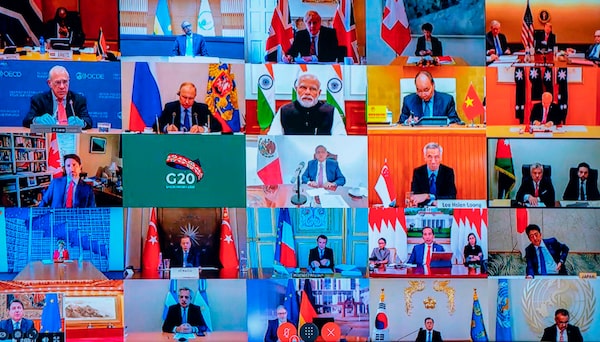
The Group of 20 countries, including Canada, last week pledged US$5-trillion in economic stimulus to combat the recession, into which their measures to slow the virus’s spread have plunged the world.HANDOUT/AFP/Getty Images
Despite being much maligned in recent years, the economic phenomenon known as globalization has lifted more than a billion people out of extreme poverty since 1990. Freer trade and global supply chains have brought investment to the developing world, and allowed millions of workers in poor countries to earn enough income to provide for their families.
The developing world is about to take a giant step backward, however, as the coronavirus pandemic threatens vulnerable populations and capital flees the poorest countries for safer – an admittedly relative term, these days – destinations.
Factories in the developing world are closing as demand for the goods they produce dries up in the West. With commodity prices in the tank, some developing countries face a run on their currencies, leaving them unable to service their debts or come to the aid of workers who lose their jobs during this recession.
What’s more, migrant workers who count on seasonal employment in developed countries are now blocked by travel restrictions. A plunge in the remittances workers normally send to relatives back home will have devastating consequences in Latin America, Asia and Africa.
“Tragically, the COVID-19 crisis risks reversing decades of progress in the fight against poverty and exacerbating already high levels of inequality within and between countries,” the United Nations warned this week in a report that called for a “co-ordinated and comprehensive multilateral response,” equal to at least 10 per cent of global gross domestic product, to offset the dislocation caused by the pandemic and its accompanying economic downturn.
Global GDP, also known as gross world product, stood at about US$86-trillion dollars in 2018. So, a global response to the coronavirus crisis on a scale the UN is calling for would amount to about US$9-trillion.
The Group of 20 countries, including Canada, last week pledged US$5-trillion in economic stimulus to combat the recession, into which their measures to slow the virus’s spread have plunged the world. But almost all of that involves commitments to prop up their own economies, with income-support programs for domestic workers and businesses.
While governments everywhere must put their own citizens first, it would be wrong for developed countries to turn inward now, as they roll out their own coronavirus response packages.
Multinational corporations, including many based in Canada, have made billions of dollars by tapping natural resources and building factories in low-wage countries. They owe those countries and their workers more than a parting pat on the back.
While globalization has been beneficial for both the developed and developing world, its benefits have not been equally distributed. So, it would be doubly unjust for rich countries to turn their backs on their poorer cousins now. Yet, that is exactly what is happening.
A report published last week by the UN’s Conference on Trade and Development (UNCTAD) estimated that global investment could decline by as much as 40 per cent in 2020. That figure is, of course, a moving target, considering the extreme uncertainty under which global businesses are currently operating. Just three weeks ago, UNCTAD was projecting that foreign direct investment (FDI) would decline by between 5 per cent and 15 per cent this year.
“The top 5,000 [multinational enterprises], which account for a significant share of global FDI, have now seen downward revisions of 30 per cent on average for 2020 earnings estimates. And the trend is likely to continue,” the UNCTAD report said.
Unlike the last recession, when cuts to corporate capital expenditures were far deeper in the developed world, poorer countries could be much harder hit this time. In 2008-2009, capex dropped by about 30 per cent among the 5,000 largest multinational enterprises (MNEs). But the drop was concentrated in the developed world. “The decline was much less pronounced in the developing economies, where capex saw zero growth for one year,” UNCTAD reported.
Now, steep reductions in foreign investment in the developing world are already materializing as multinationals move to conserve capital. Energy and mining projects in the developing world are being put on hold or cancelled.
With existing factories closing, expansion plans have been scrapped. Fears about running out of critical supplies is also putting pressure on rich countries to reduce dependence on medical devices produced in developing countries.
This is a moment that cries out for global solidarity. Yet, after decades of exploiting the supply chains that connected the world’s economies in a win-win exercise that expanded the overall size of the global economic pie, short-sighted policymakers in the developed world now risk throwing the developing world into an even deeper economic crisis than our own.
We would all end up paying for that mistake in incalculable ways.
Keep your Opinions sharp and informed. Get the Opinion newsletter. Sign up today.
 Konrad Yakabuski
Konrad Yakabuski